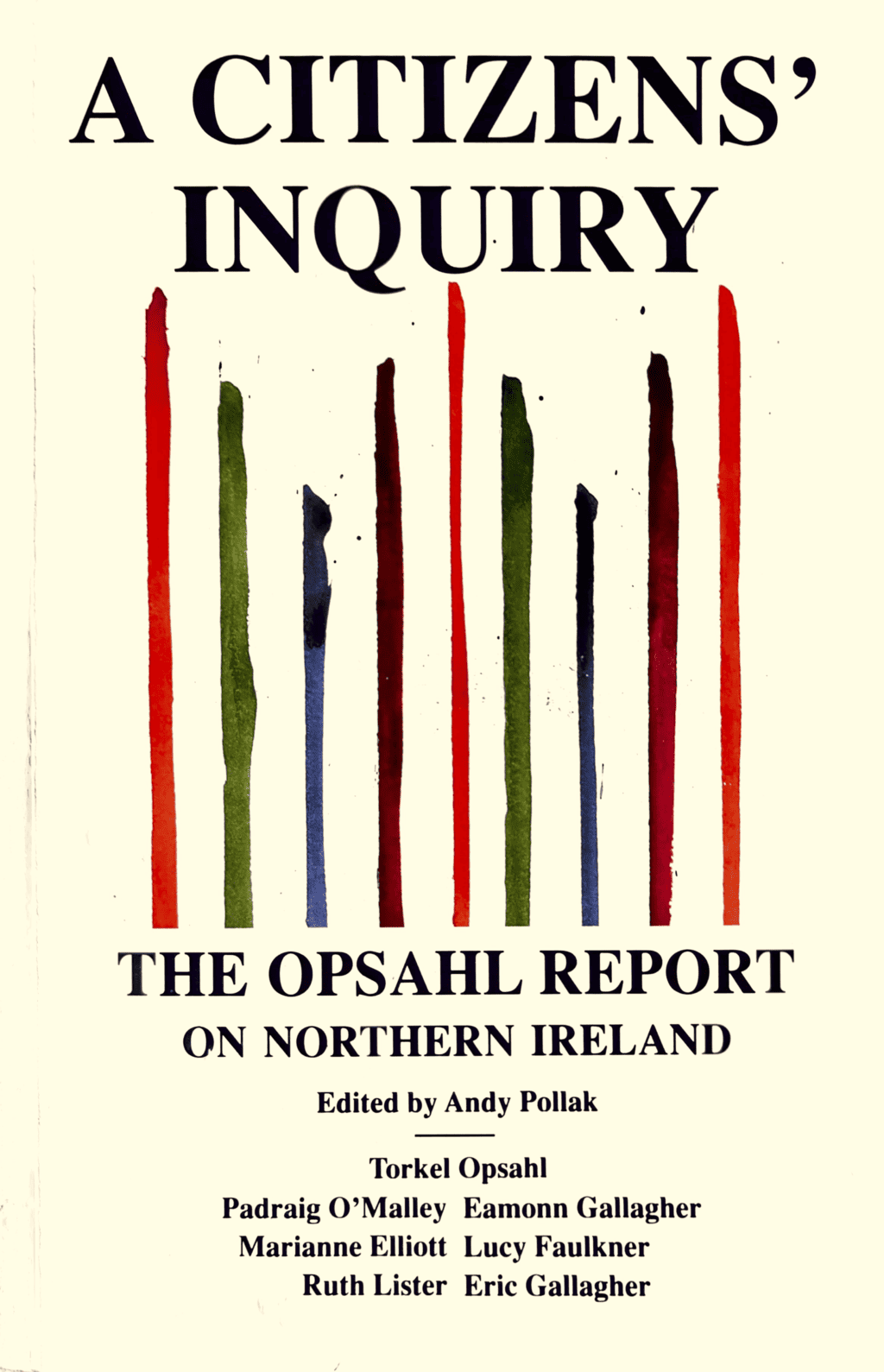Laurence Simms (joint secretary of the British-Irish Secretariat) hosted a reception to mark the 30th anniversary of the Opsahl Commission, which invited and gathered oral and written submissions from individuals and civil society organisations about their suggestions for the way forward in Northern Ireland. Several dozen guests at the Notting Hill residence listened to reflections by various participants of the initiative and shared their stories with each other afterwards.
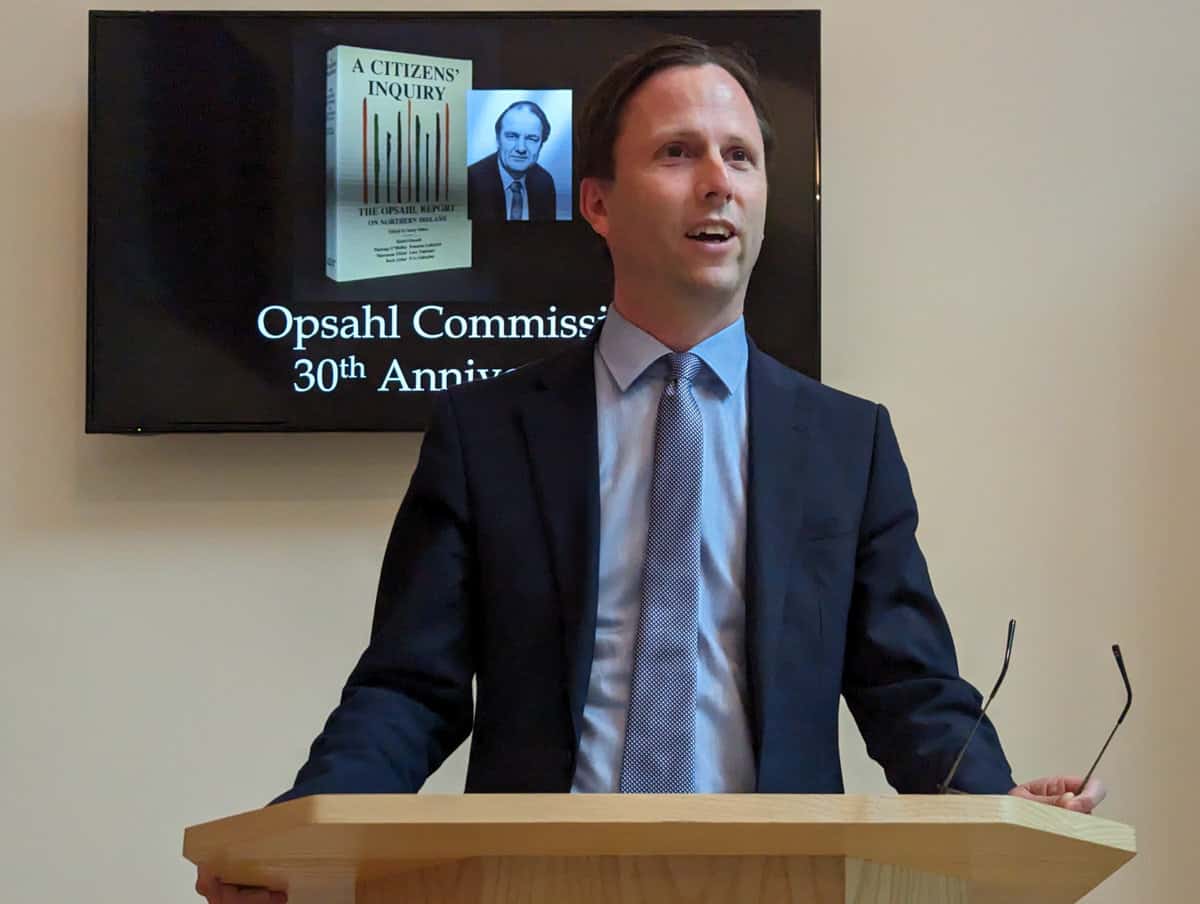
Simms welcomed all who travelled long and short to attend. Remarking on the recent 25th anniversaries of the Belfast/Good Friday Agreement and the referendum, he said:
“It is incredibly important in history and in the public imagination… that we do not reduce the extraordinary positive transformation that we have seen in this society on this island and in these islands to either one event, one document — imperfect as it is — or to a narrow circle of political and government figures.
“Certainly, everybody in this room knows, and many beyond, the role that civil society played at every stage in creating the space for politics and communities to bridge some of those divides — to providing ideas about how to overcome deadlock and build momentum to move past dialogue into action and genuine positive change.
“I think the Opsahl Commission really stands as a major example of the potential of that dimension of the progress that we have seen. It was and is a deeply serious, comprehensive, ambitious piece of work that changed the dynamic that informed everything that came afterwards and stands as an example of what is possible when people come together around a constructive agenda.”
Simms thought that it was telling that the Belfast/Good Friday Agreement included the commitment to continue to draw on the expertise and contribution of civil society into the future, through the Civic Forum (section 34) as well as an independent north-south consultative forum (section 19). However, he said that both of these fell under aspects of the peace accord that were not implemented as they should have been, including the New Decade, New Approach agreement, which includes a commitment to hold at least one citizen’s assembly annually (section 3.9).
He spoke of the Irish government’s appreciation of the value of civic society and its contribution to transforming and progressing wider society, through its Reconciliation Fund (promoting community-level dialogue) and the Shared Island Initiative (built on three pillars of investment, research, and dialogue). Specifically, for the latter he cited a Shared Island Civic Society Fund, designed specifically to help civil society groups, north and south, learn from each other, work together, do joint projects, and encourage one another:
“In all of this, I think the Opsahl Commission provides a really important benchmark for the level of ambition that can be shown and the level of impact that can be created.”
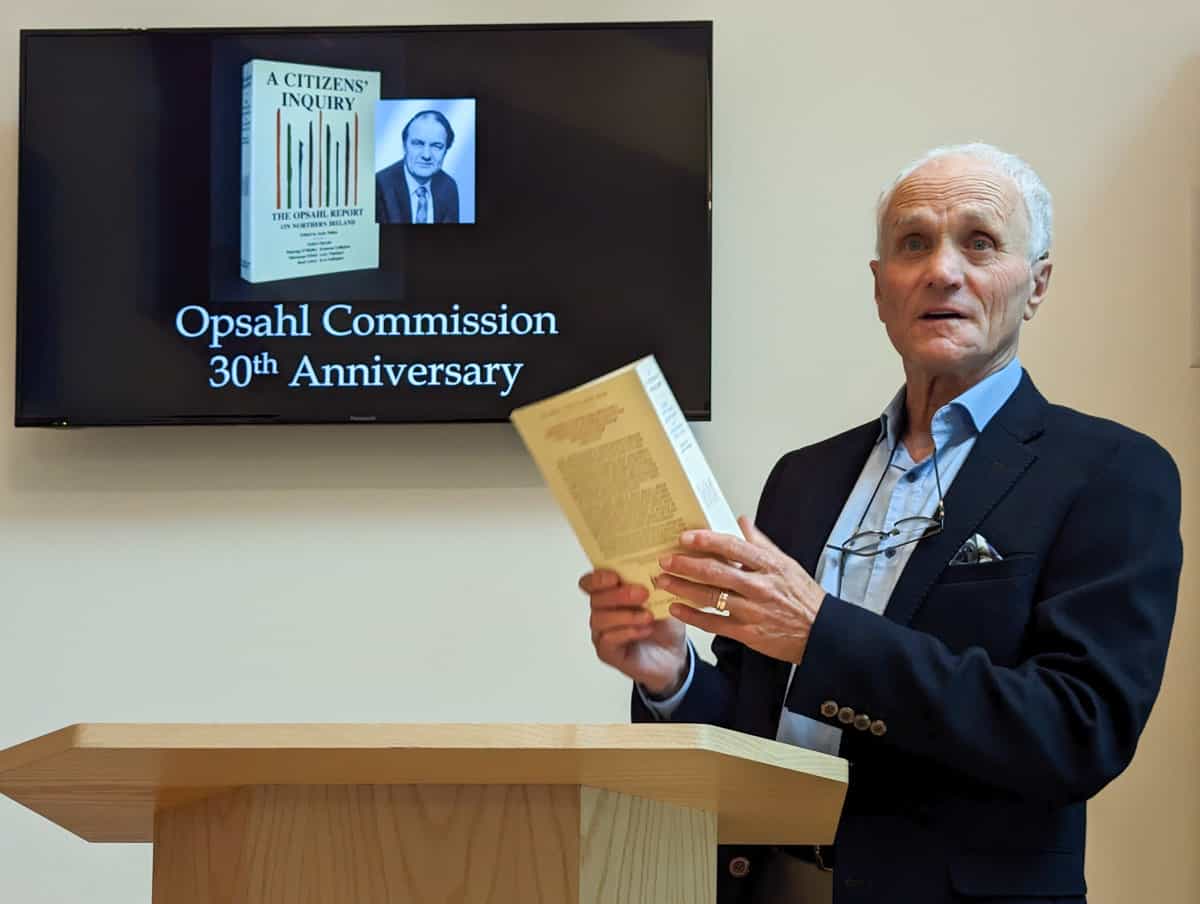
Andy Pollak paid tribute to Torkel Opsahl, whose image was displayed on a background monitor: “I remember coming in one morning to the office to see that he had been up all night finishing his bit of the report. He made a huge commitment.” Opsahl died three months after the report was published, working to find a solution to the civil war in former Yugoslavia.
Pollak said that the report was the hardest work he ever did in his life, and thought it led to something useful: “Certainly, people whose opinions I respect have even gone as far to say it was one of the small early seeds of the peace process here.”
He also paid tribute to absent friends, some people that he couldn’t find for this event. One was Vivienne Anderson and a group of north Belfast women “who made a super presentation to the commission; so good that Stockholm City Council gave them a peace prize”. Other absent friends were Kathleen Feenan and Mary Leonard, both of Twinbrook.
Pollak concluded by quoting eminent political scientist Bernard Crick, who said of the Opsahl Commission: “The fullest and most judicious account of opinion in Northern Ireland ever made. The commission argues with rare, wise, humane realism that to reach some resolution of some of the problems, even temporary accommodations that can allow a peaceful way forward — and to pass on other problems to the future and in a calmer climate — is a good enough day’s work for our part.”
Pollak responded by saying that he thinks that still holds today:
“Sometimes people seem to be running towards a particular destination that I think can lead us to more trouble. Let’s stop and think and pass over — perhaps to a wiser future generation — some of the many problems that still exist in society.”
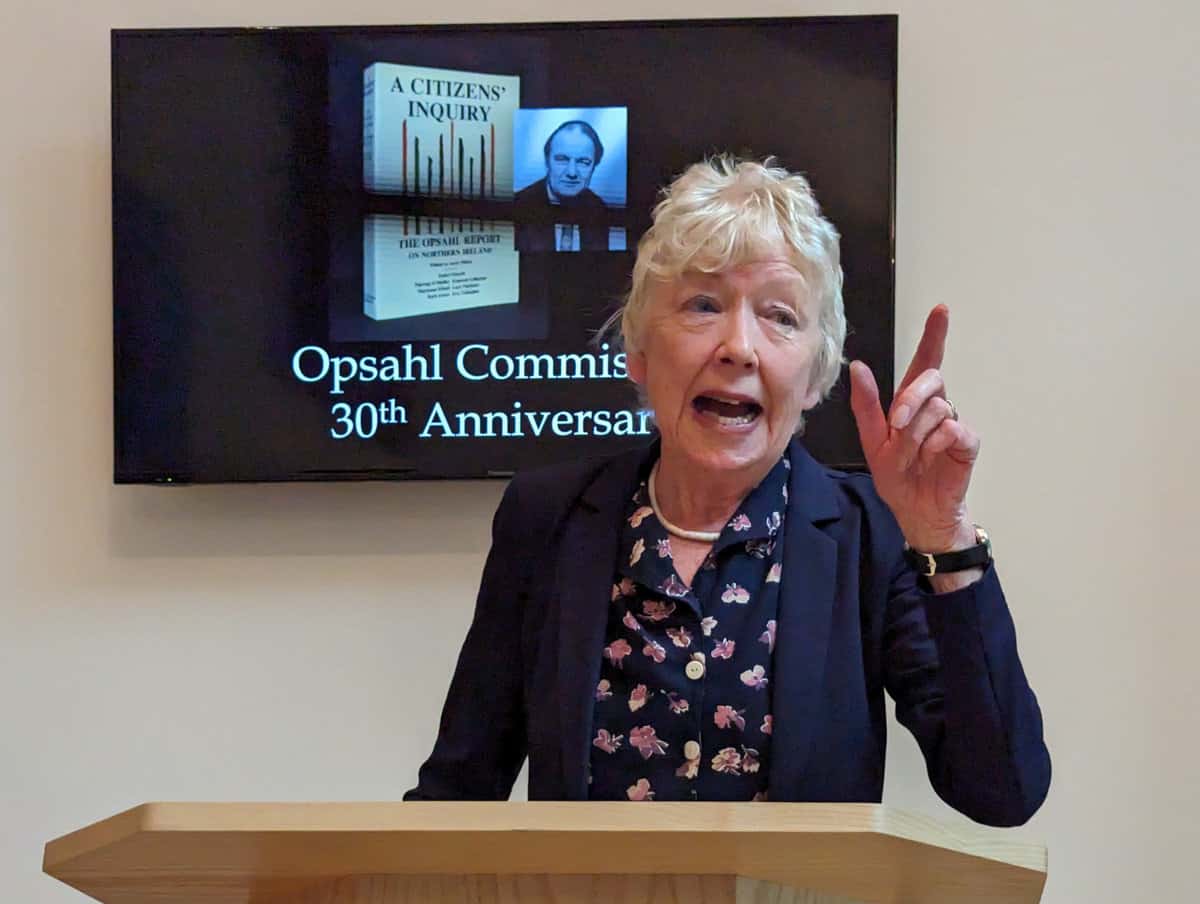
Professor Marianne Elliott said that the work was one of the biggest turning events in her life and one of the most exhausting: “You started between seven and eight in the morning, and every day there would be public hearings in front of television cameras, and end about 10 o’clock at night.”
She remarked that the work took place in 1992–93, as the worst year for sectarian murders: “Everything was spiralling out of control, and we were meeting in the middle of it.”
Elliott thanked those who made contributions, especially those from whom the commission wanted to hear: working-class people, women, and those living in areas dominated by paramilitaries: “Boy did they come forward with enormous courage.”
She described how working with Vivienne Anderson’s group on Cliftonville Road, Belfast, changed her research perspective:
“I started writing about the things that I heard these women [say]. They were desperately trying to maintain relations across fractured communities. They were just so impressive; I’m actually just finishing another book, 30 years later, that was inspired by what they were doing.”
Elliott also recalled saying to women from housing estates that they needed to get more directly involved in politics, and argued that the Opsahl Commission did empower some women to do so.
She claimed that the commission’s most controversial proposal was to bring Sinn Féin into normal politics:
“Oh my goodness, nobody liked it, did they? The Irish News said, ‘She would say that, wouldn’t she, because she’s written about Wolfe Tone.’ Well, looking back at it, whatever you think of politics nowadays, it was the right thing to say.”
She defended this view with an anecdote of a private conversation that she had at the time with a 17–18-year-old young person in Dungannon who supported the IRA and told her, “The war’s going nowhere; we need to see [a way] out.”
Elliott said that those in civic society, across all age groups, were thinking that something had to be done to bring the dismal era to a halt: “I think we gave them an outlet.”
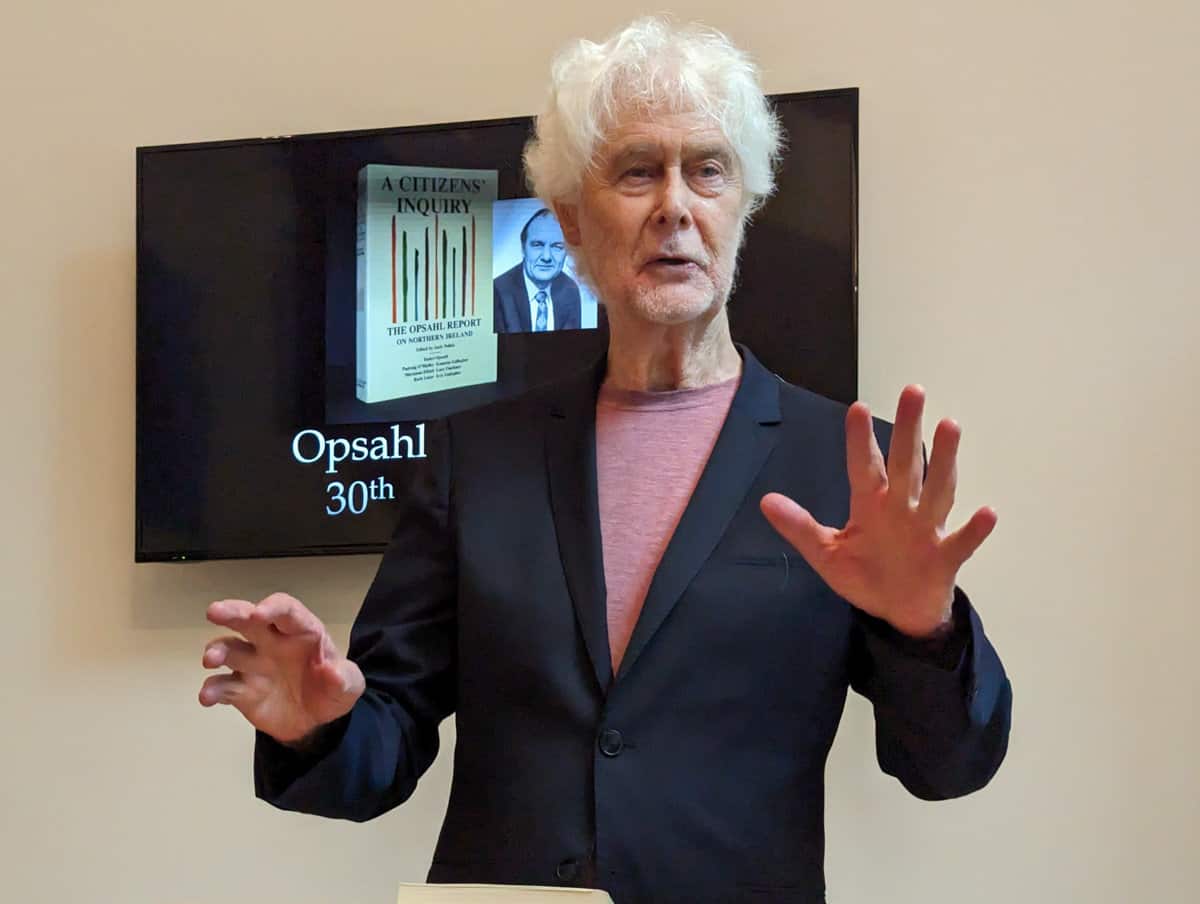
Professor Padraig O’Malley, who flew in from Boston specifically for the event, expressed gratitude to individual members of the commission:
“Torkel Opsahl gave the gravitas and international accolades with his work for human rights.
“Eamonn Gallagher gave the knowledge of Anglo–Irish affairs that was unmatched. And he coined the phrase ‘parity of esteem’ that found its way into the Good Friday Agreement and into the English language.
“Eric Gallagher was a Methodist minister who took the brave step among Protestant clergymen by meeting with members of the IRA at Feakle [County Clare] in 1974 — a breakthrough.
“Lady Faulkner was modest, yet hard as nails in a polite way, who brought a unique unionist perspective.
“Marianne Elliott and Ruth Lister brought intellectual rigour and scholarship, and kept us on our way when we wandered.
“Andy Pollak. You may wonder why Andy has lost so much hair over the years. He went berserk — papers and transcripts flying, everything all over the place. And yet he brought it home, on time. Quite an extraordinary achievement.
“Robin Wilson, unobtrusive but always present. Thank you, Robin, for making Initiative ’92.”
Andy Pollak further thanked Professor Simon Lee, co-founder of Initiative ’92 and the next speaker.
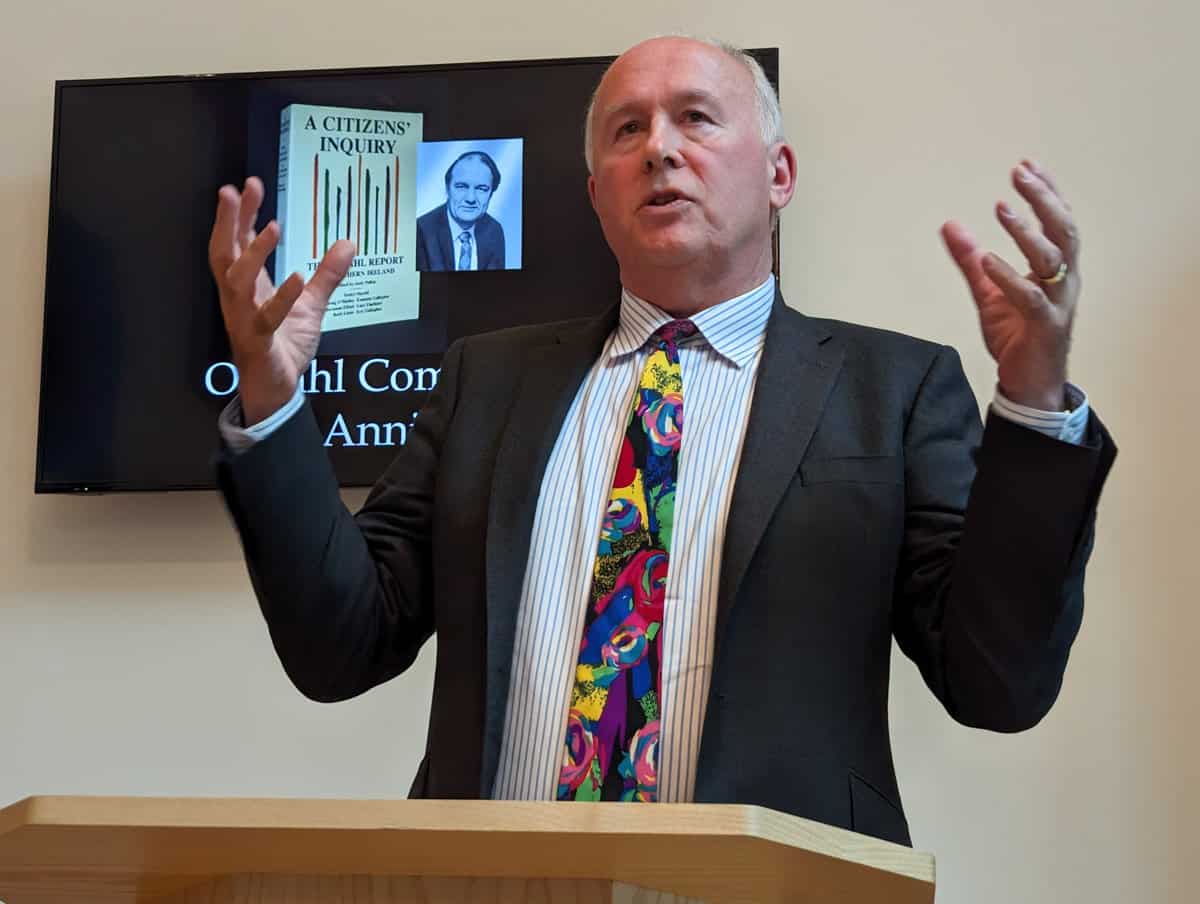
Simon Lee began by informing the audience that recently wrote “a hugely long article” about the work of the Opsahl Commission in the Journal of Dialogue Studies, which looks at dialogues around the world.
For this event, he said that he wanted to speak about two things: poems and parables.
He cited Charles Causley, a Cornish poet who said that poetry doesn’t yield up its meaning in one go, kicking off like a bright light and that’s all. Rather, a poem yields its meaning over the decades, and the meaning changes depending on what’s happening in your life. Lee then put it:
“I would like to think of Initiative ’92, which led to the Opsahl Commission and its reports, as essentially civic poetry in action. It’s still yielding up insights.”
Lee referenced two specific poems. The first was Michael Longley’s “A Blessing”, which talks about offering space, a clearing in the jungle. The second was Seamus Heaney’s “The Skylight”, motivated by an argument about whether to create one in a traditional cottage of his household. It relates to a passage in the Bible where Jesus is in a packed house and a man with disabilities can’t get in. Others help by hauling him to the roof, where tiles are removed and he is lowered in. Lee said:
“This is very powerful for me. It explains what the founders, the patrons, the supporters, and those who submitted work were about. We did not, contrary to politicians’ views, have some sort of messianic complex that we were the figures with the answers in the house. And we weren’t the people surrounding that figure. We probably could have got in ourselves. We had our own voices. But what we wanted to do is to lift up those who didn’t have that opportunity. Get them on the roof and find a way to lower them down. And then stand back and let the transformation work.”
Lee related three parables. In the parable of the labourers in the vineyard, those who come late have to be treated on equal terms, if you want transforming grace. In another vineyard parable, the owner asks his first son if he’ll go and work at the vineyard. The son replies “yes” but doesn’t go. The owner asks his second son, who replies “no” but does go. Yet Lee suggested a third scenario, applicable to Northern Ireland — the one who says “no” and definitely means “no”:
“In addition to the father, there would have been a mother and some daughters in the room. When all of this is kicking off, the mother would just signal to the daughters and they’re off sorting it out in the vineyard.”
Lee’s final parable was a secular one, about the word “serendipity” from the Three Princes of Serendip. The king sends the princes out into the wider world, not in a quest for a particular outcome but for them to try to find their way, by finding clues and spotting things that other people have missed. The princes come out stronger for it:
“And I believe that the people who made submissions [to the commission] and the people who hear about the submissions — second-, third-, fourth-hand — and the people who are still hearing about it, have all benefited from this wonderful experiment for which many thanks to you all.”
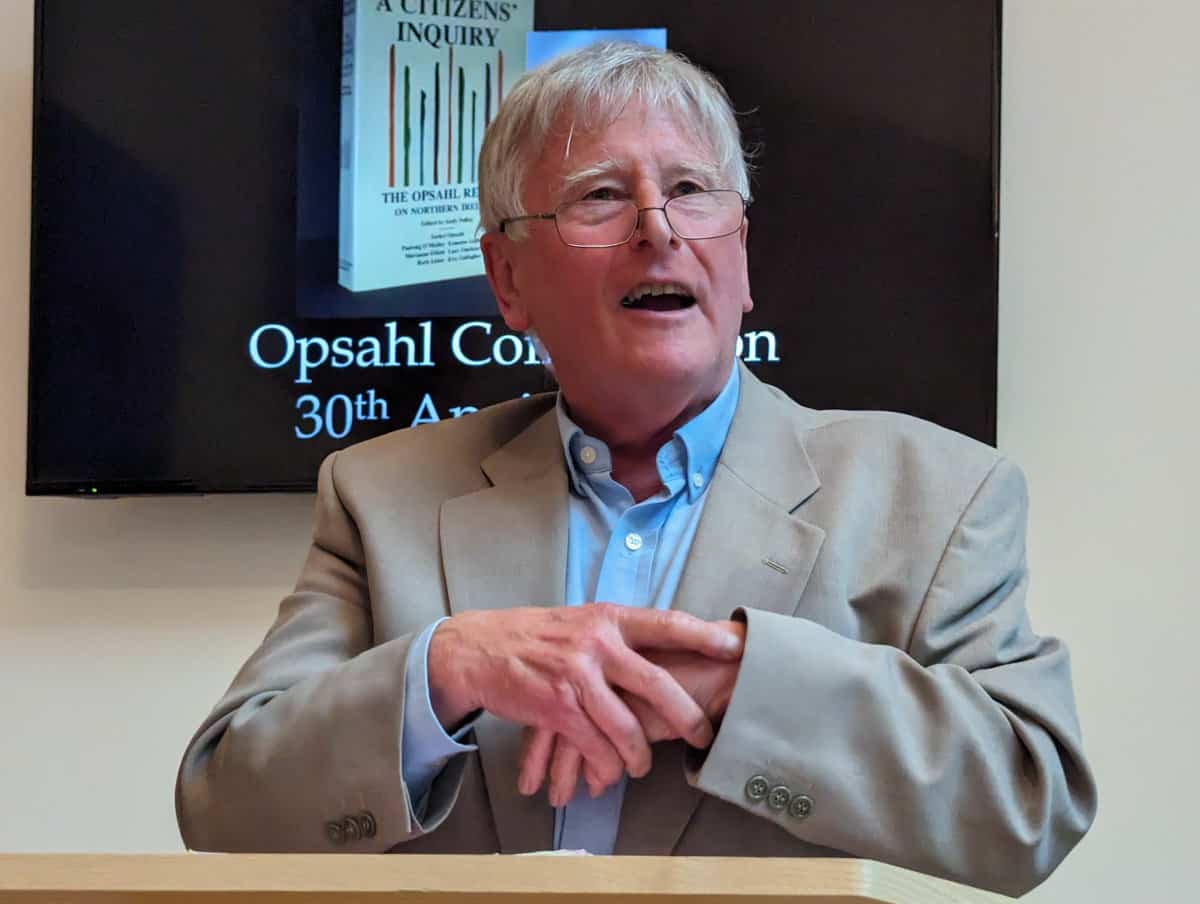
Stephen Pittam, former general secretary of the Joseph Rowntree Charitable Trust (JRCT), was invited to speak about its funding of the project. He explained how he spent the previous afternoon in the foundation’s archives, looking at a massively thick file, starting off as Initiative ’92 and ending up as the Opsahl Commission. Six days after he met Simon Lee and Robin Wilson at the Fortnight office on 2 September 1991, the trust offered a guarantee of £100,000. A challenge was to transfer the “amazing vision” of two people into a committee. When the committee went out into the community, everybody was talking about the initiative:
“Everywhere we went, people said, ‘Look you must back this initiative… But it was really tough in the beginning. But the persistence and the magic of Andy Pollak was really remarkable.”
Pittman cited the other supporters and funders, such as the Northern Ireland Voluntary Trust, the Ireland Funds, and the Nuffield Foundation:
“In the end there was a real group of people who were really backing this.
“I think we’ve got to remember how depressed people were in 1991 and 1992. This initiative was really an inspiration and something I think from the JRCT point of view was one of the most important things we did. To think that the whole thing was done on a budget of about £240,000 is just remarkable.
“And so, thank you. Thank you to Andy. Thank you to Robin and Simon for the vision. And thank you to the commissioners for all the work they did. And thank you to everyone who made their contributions.”
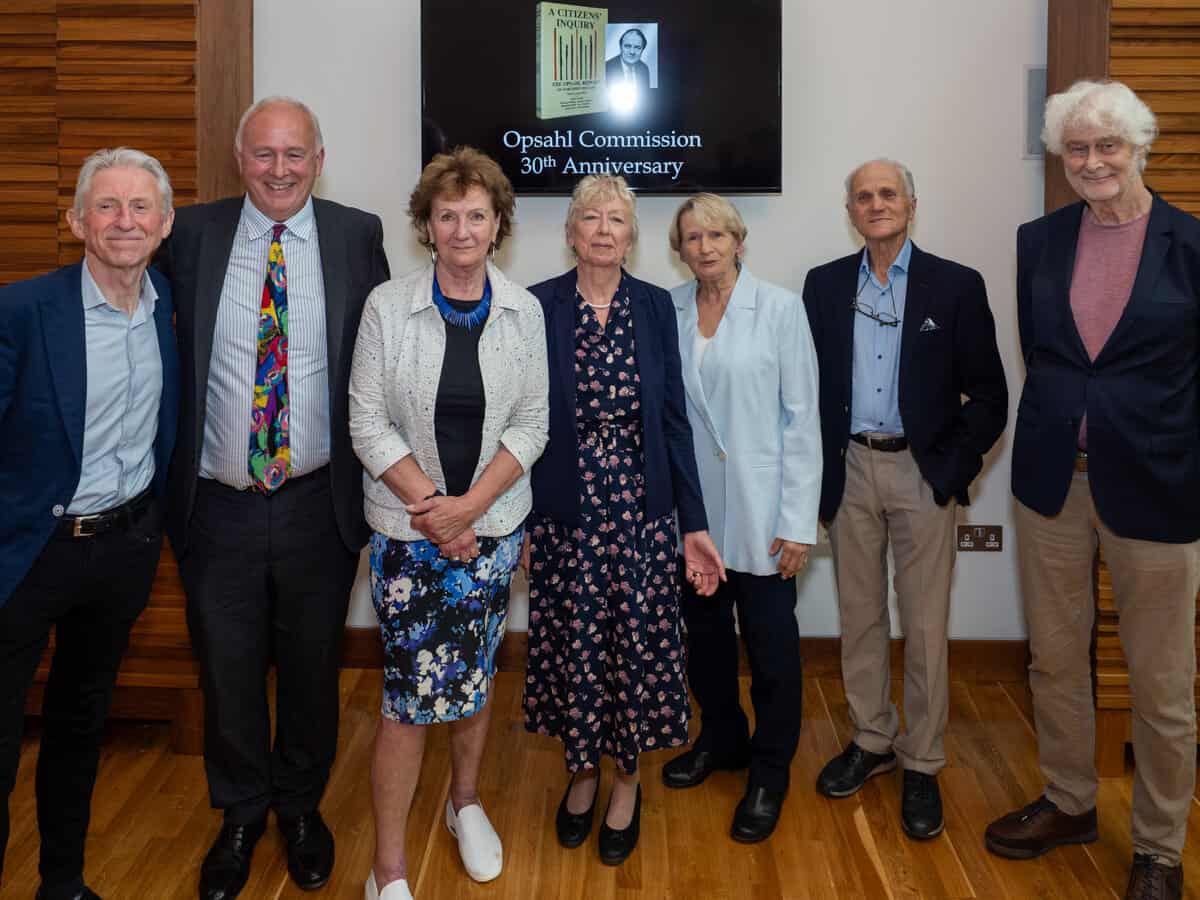
Cross-published at Mr Ulster.
Peacebuilding a shared Northern Irish society ✌️ Editor 🔍 Writer ✏️ Photographer 📸 https://mrulster.com
Discover more from Slugger O'Toole
Subscribe to get the latest posts to your email.
